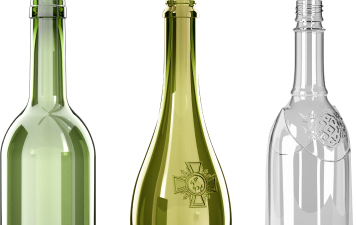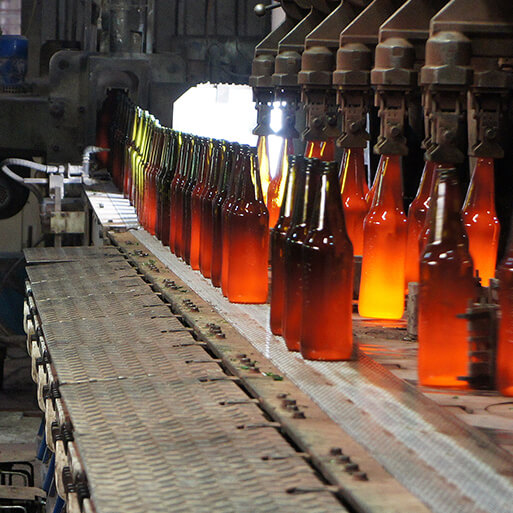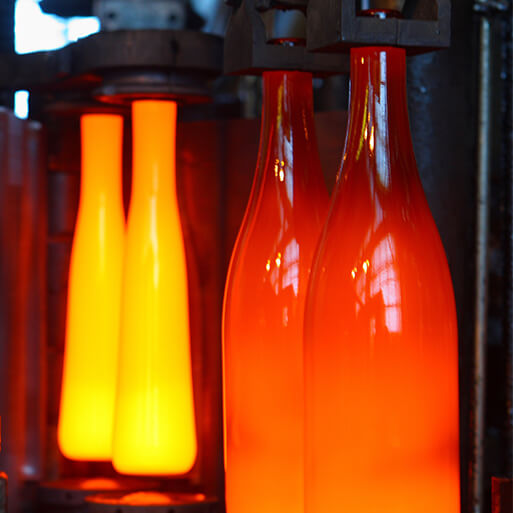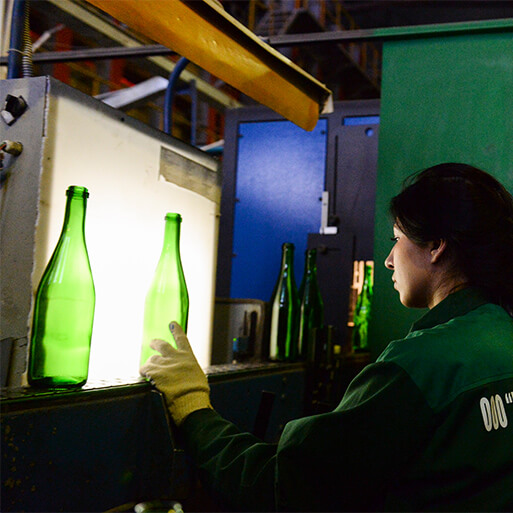PRODUCTION PROCESS

General information
Glass is rightfully considered one of the oldest materials in the world; its popularity has been maintained for several millennia. Glass containers are actively used by people in everyday life, which causes an ever-growing demand for the company’s finished products.
The production process of glass containers includes the following steps:

- Preparation of raw materials.
- Glass melting.
- Glass molding.
- Annealing.
- Finishing treatment.
- Quality control.
Amalgamated glass works, LLC positions itself as a modern and dynamically developing manufacturer, actively using the latest equipment and developments in the glass industry. The highest quality, environmental and chemical safety of glass products is ensured through the implementation of its own quality management system “PSP”.

Preparation of raw materials
Bottle glass is made from a special mixture of chemicals and fillers: soda ash, quartz sand, glass cullet, limestone flour with the addition of various dyes. To obtain glass products that have the specified characteristics, it is necessary to clearly and carefully control the composition and proportions of the elements that are included in the charge mixture.
Glass melting
The charge mixture, adjusted to the milligram, is sent by an automatic conveyor to the regenerative furnace, where it is heated to the melting point. At the end of this technological stage, a liquid glass mass is obtained, from which refractory elements and gas bubbles are forcibly removed.

Glass molding
Before proceeding directly to the formation of glass containers, the molten glass mass is cooled to the molding temperature. To give the glass mass the shape of a bottle, it is cut into drops, which enter the glass forming machine at a speed of more than 1.5 products per second, where the process of forming a drop into a bottle is carried out with the help of compressed air and vacuum. The finished glass products are sent to the next stage for further processing.
Annealing
The use of fritting technology makes it possible to give glass bottles the required mechanical strength, resistance to temperature changes. The procedure is performed in special kilns with direct heating and then a smooth step-by-step cooling process, which removes you to remove the stress of the glass and increase the strength.

Finishing treatment
To prevent accidental damage to the glass container during packaging and transportation, the bottles are subjected to finishing treatment with a special solution of chemicals.
Quality control
Manual and machine methods are used to check the quality of finished glass products. Technological control is carried out in accordance with the technical conditions, the technical task of the customer, the draft and drawing documentation, the standards and regulations in force on the territory of our country. During the implementation of control measures, experts check the compliance of the glass color with the color agreed with the customer, the absence of casting defects and bubbles in the glass mass, the compliance of volumes and sizes with the specified parameters. Glass containers that have not passed quality control are rejected and sent for remelting.
Glass containers that have successfully passed quality control are packed and sent to the warehouse for the further delivery to the customer.


